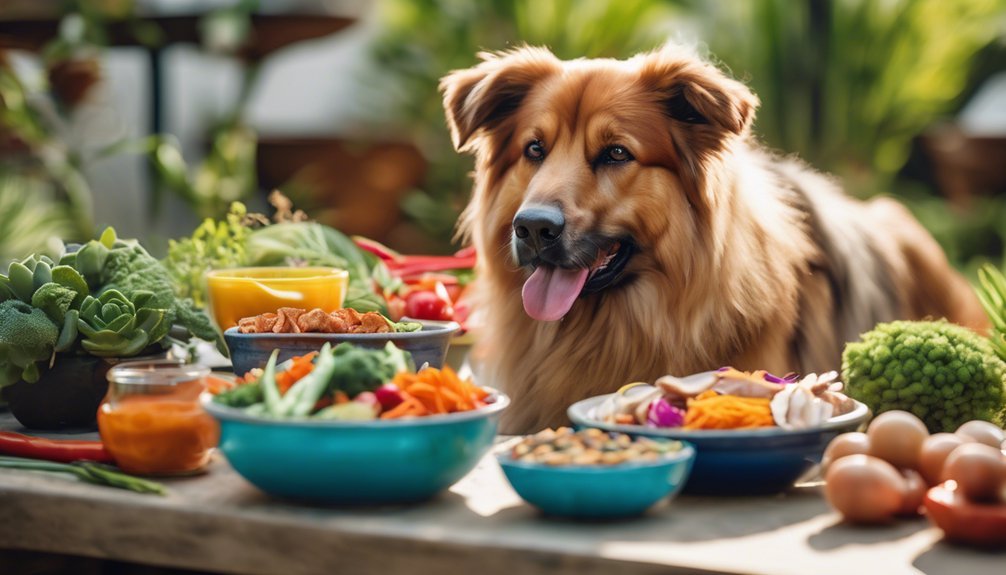
Understanding the role of protein in your pet's coat health is crucial for maintaining their overall well-being. Protein isn't just a dietary requirement; it directly impacts the strength and appearance of your pet's fur. By recognizing the significance of quality protein sources, you can address common issues like shedding and skin irritations. But what types of protein should you prioritize, and how can you ensure your pet's intake is balanced?
Key Takeaways
- Protein is essential for maintaining a shiny, healthy coat and supports hair growth and repair.
- Both animal and plant proteins provide necessary amino acids and nutrients for optimal coat health.
- Inadequate protein can lead to dull fur, excessive shedding, and skin irritations.
- Adequate protein promotes collagen and keratin production, resulting in a strong and resilient coat.
- Monitoring your pet's coat appearance can help detect protein deficiency early on.
The Importance of Protein for Your Pet's Coat

While you may not realize it, protein plays a crucial role in maintaining your pet's coat health. This essential nutrient not only supports the growth of new hair but also aids in the repair of damaged strands.
Quality protein sources, such as lean meats, fish, and eggs, provide amino acids that are vital for your pet's overall coat maintenance. Without adequate protein, your pet may experience dullness, excessive shedding, or even skin issues.
Therefore, ensuring your furry friend receives sufficient protein in their diet is key to keeping their coat shiny and healthy. Regularly assess their food to confirm it meets their protein needs, and watch how these changes positively impact their coat's appearance and texture.
Types of Protein Beneficial for Coat Health
To ensure your pet's coat remains healthy, it's essential to incorporate a variety of protein sources into their diet.
Animal proteins, such as chicken, beef, and fish, provide complete amino acids crucial for coat strength and shine. These proteins contain essential fatty acids, promoting skin health and reducing dryness.
On the other hand, plant proteins like peas, lentils, and quinoa can also be beneficial. They offer important nutrients and fiber while being easier on digestion for some pets.
Combining both animal and plant proteins ensures your furry friend gets a balanced diet rich in essential nutrients.
How Protein Affects Shedding and Skin Conditions

Protein plays a significant role in managing shedding and skin conditions in pets. Adequate protein intake is crucial for protein synthesis, which helps maintain healthy skin and fur.
When your pet receives sufficient protein, it promotes the production of keratin and collagen, essential for a strong coat and resilient skin. This, in turn, contributes to shedding reduction, as a well-nourished pet sheds less often and experiences fewer skin irritations.
Conversely, insufficient protein can lead to dull fur and increased shedding, making your furry friend more susceptible to skin conditions.
Recognizing Signs of Protein Deficiency
A healthy coat is often the first indicator of your pet's overall well-being, and noticing changes in their fur can signal a protein deficiency.
If you see dullness, excessive shedding, or patches of hair loss, these could be signs that your pet isn't getting enough protein in their diet. A shiny, vibrant coat typically reflects adequate protein intake, while a lack of this essential nutrient can lead to a weak and unhealthy appearance.
Additionally, you might notice an increase in skin irritations, as proteins play a key role in maintaining skin health.
Keeping an eye on your pet's coat appearance is crucial for early detection of potential health issues, ensuring they remain happy and healthy.
Recommended Protein Sources for Pets

Selecting the right protein sources is essential for maintaining your pet's coat health and overall well-being. Incorporating high-quality meats, such as chicken, turkey, and fish, provides crucial amino acids that promote healthy skin and a shiny coat. These proteins enhance your pet's nutrient absorption and overall vitality.
Additionally, consider integrating plant-based proteins like lentils, chickpeas, and quinoa into their diet. These sources not only offer essential nutrients but also support digestion.
When you combine high-quality meats with plant-based proteins, you create a balanced diet that supports your pet's coat health while ensuring they receive a variety of nutrients.
Always consult your veterinarian to tailor protein sources to your pet's specific needs for optimal results.
Tips for Ensuring a Balanced Protein Intake
To maintain your pet's coat health, balancing their protein intake is vital. Start by diversifying protein sources; consider high-quality meats, fish, and plant-based options. Each source offers unique amino acids essential for optimal coat condition.
Monitor the protein content in their diet, ensuring it aligns with their age, size, and activity level. It's crucial to consult with your veterinarian to tailor a balanced nutrition plan that meets your pet's specific needs.
Incorporate supplements if necessary, but always prioritize whole foods first. Remember, a gradual transition between diets can help avoid digestive upset.
Frequently Asked Questions
Can Protein Help With Allergies Affecting My Pet's Coat?
Yes, protein can help manage allergy symptoms in pets. Incorporating high-quality protein sources into their diet may strengthen their immune system, potentially alleviating skin issues and promoting a healthier, shinier coat.
How Does Cooking Affect Protein Quality for My Pet?
Cooking's like a dance that alters raw protein's essence; different methods can either preserve or diminish its quality. High heat may denature proteins, affecting digestibility, while gentle techniques might better retain their nutritional benefits for your pet.
Is a High-Protein Diet Suitable for All Pets?
Not all pets thrive on a high-protein diet; you need to consider their age, breed, and health. While high protein benefits some, others may require balanced nutrients for optimal health and well-being.
Can Protein Supplements Improve My Pet's Coat Condition?
Did you know that 70% of pet owners notice improved coat shine after adding protein supplements? By incorporating high-quality protein sources into your pet's diet, you can enhance their coat condition significantly, boosting overall health and appearance.
What Are the Risks of Excessive Protein for Pets?
Excessive protein can lead to protein toxicity in pets, causing kidney strain. This can result in serious health issues, including increased urination, dehydration, and potential kidney damage. Always consult your vet before altering your pet's diet.
Conclusion
In conclusion, ensuring your pet receives adequate protein is like nurturing a vibrant garden—without the right nutrients, the blooms fade. A balanced protein intake not only supports a shiny, healthy coat but also prevents issues like excessive shedding and skin irritation. By choosing quality protein sources and recognizing signs of deficiency, you can cultivate your furry companion's coat health, transforming it into a luxurious, soft mane that showcases their vitality and well-being.





